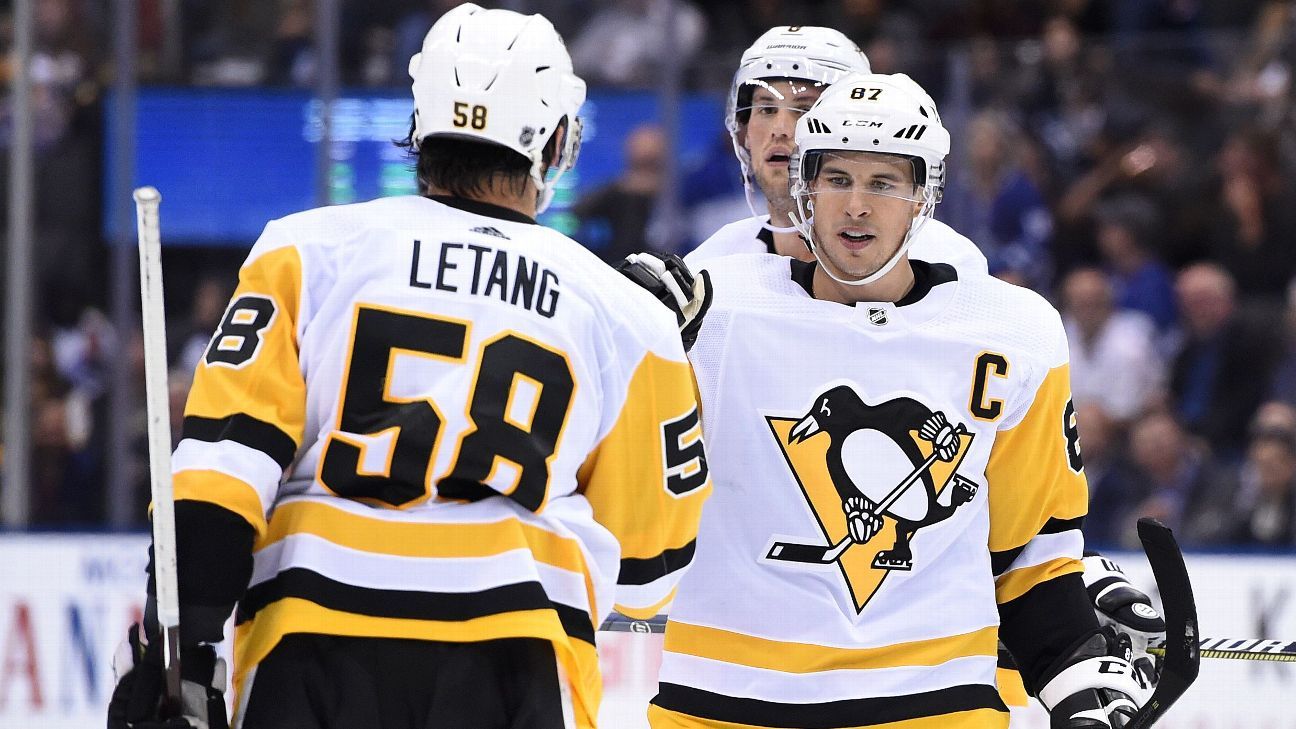The Pittsburgh Penguins have not played since their 3-0 win over the Toronto Maple Leafs on Thursday. Since then, the Penguins have been nomads, by choice. Pittsburgh opted to turn its upcoming three-game, five-day Western Canada swing into a 10-day excursion. After the game Thursday, the Penguins did not return home. They practiced at the AHL Marlies’ arena, then traversed West, settling for the past two days in Banff, Alberta, a scenic resort town.
The @penguins are exploring Banff pic.twitter.com/WtUGBUxdAs
— Kristopher Letang (@Letang_58) October 21, 2018
“Even though we have a lot of returning players, we have some new guys on our team,” coach Mike Sullivan told reporters. “This is a new season and a new challenge, and we’re trying to come together as a team.”
That’s the thing about these Penguins: They have yet to establish an identity. The assumption was that, after two taxing Stanley Cup runs, Pittsburgh got rest from an early playoff exit and retooled to be back and better than ever in 2018-19. But how different is this team from its most recent Stanley Cup iterations? Three weeks into the season, we take stock of the Penguins:
It’s still top-heavy production
They’re only six games into the season, but Evgeni Malkin (three goals, nine assists) and Phil Kessel (four goals, four assists) are producing above a point-per-game clip. Sidney Crosby‘s top-line sidekick, Jake Guentzel, has also scored four goals. The 32-year-old Malkin (42 goals last season) and the 31-year-old Kessel (92 points in 2017-18) are coming off some of the most productive seasons of their careers, so the carryover production is welcome news for the second-oldest team in the league (the average Penguin is 28.7 years old).
The Penguins fall around the league average in early scoring, with 3.33 goals per game, and they aren’t getting much from the bottom six. These are the same old Penguins because it appears coach Mike Sullivan isn’t finished line shuffling. It will be interesting to see if Derick Brassard finds a more permanent home at third-line center or at top-line wing, where he’ll see increased scoring opportunities. Patric Hornqvist (just one assist in six games) is currently slated in the bottom six, but it likely behooves the Penguins to bump him back up.
Once again, the fourth line is looking like a rotation. It’s clear that Sullivan doesn’t yet trust Daniel Sprong, who is averaging less than nine minutes per game. Derek Grant, a cheap free-agent acquisition (signed for one year, $650,000) could get a shake soon.
After he underwent neck surgery in April 2017, uncertainty surrounded the rest of Letang’s career. Even though he put up offensive numbers, there was no question that the 31-year-old took a step back last season. These defensive lapses stirred concern. Entering this season, there was chatter about limiting Letang’s ice time; a decreased workload could get him back on track, the thought went.
Through six games, none of that is the case. Letang is averaging 26:08 in ice time per game (21:02 at even strength, second among all NHL skaters). He has had no problem getting pucks on net, with 22 shots in six games, and he has already recorded four goals and four assists. What’s more, he’s controlling the puck and pace of play, and he has looked fantastic alongside partner Brian Dumoulin as a true top pairing. The duo has been on the ice together for 97 minutes, and in that time, they have posted a 61.7 Corsi for percentage, which ranks seventh among all defensive pairings who have played at least 50 minutes together.
Some questions remain on defense
The Penguins seem to be over-relying on the Dumolin-Letang pairing because the rest of the defense has been middling. Pittsburgh lost one of its best blueliners, Justin Schultz, after he underwent surgery to repair a fracture in his left leg. Schultz should return this season — he’s estimated to miss about four months — but GM Jim Rutherford might not be willing to wait it out for reinforcements. Including Schultz, Pittsburgh is spending nearly $27 million on seven defensemen but isn’t getting the returns.
It’s too early to judge the Jack Johnson career rehabilitation project, though it is noteworthy that he is the only defenseman besides Dumolin and Letang whom the Penguins have trusted to play 20-plus minutes per game. Olli Maatta and Jamie Oleksiak have been underwhelming, and though the Penguins boast versatility in their blueliners, there’s a clear deficiency on the right side. Pittsburgh has Chad Ruhwedel on reserves as a No. 7 defensemen, but rumors will linger about whether help is (and should be) on the way via trade.
Experience, experience, experience
I attended the Penguins’ impressive win over the Maple Leafs on Thursday and found two postgame quotes to be particularly telling.
First, Toronto coach Mike Babcock: “I think all victories you’ve got to earn. It was right there for us to find another step and get better and find a way to get on the inside a little more, and they did a good job. They kept us from doing that. There’s a lesson learned in that. They’re a more veteran, polished playoff team than we are.”
Next Malkin: “[We don’t] think about the Leafs. We know it’s a tough game. We know they have six wins already. We know they play very well, but we focus our game. We know we have a great team, and if we play smart, if we play right, we’ll beat any team in the league. We have a great, experienced team. We know how to play tough games. We know how to play against skilled guys. We showed tonight. We stopped [Auston] Matthews tonight. Finally, he did not score, you know?”
What’s the underlying theme here? Although the Maple Leafs dazzled and dominated headlines the past three weeks, they’re still a young, unproven team. The Penguins’ been-there-done-that exposure pays dividends now, especially in the grind of a long season. What’s interesting about the Penguins so far is that they’ve played up or down to their competition. Consider, Pittsburgh has faced the hottest team in hockey, the Maple Leafs, as well as the Vegas Golden Knights and Washington Capitals, the two 2018 Stanley Cup Final participants. In those games, the Penguins are 3-0. Against the Montreal Canadiens and Vancouver Canucks, once again projected as lottery teams, Pittsburgh is 0-1-2.
“This early in the year, you should be up for everybody,” Crosby said after the Toronto win. “For whatever reason, it’s worked out that way. … You need to have that urgency, and you need to have that desperation level. It takes time to get those habits. [The Maple Leafs game] was probably our best game of the year so far. It’s important to build off of this one.”
Cautious optimism on Murray
Matt Murray is just 24 years old and a Stanley Cup champion. When he’s on top of his game, he’s one of the best goalies in the world. But it’s frightening to think about this: He has had eight injury absences since he entered the league in 2015-16. That includes three diagnosed concussions and two in the past calendar year.
Murray returned from his latest concussion on Thursday and sparkled, turning away all 38 shots, including some dangerous chances (a point-blank pad save on John Tavares in the second period stands out.) “He won the game for us tonight,” Malkin said.
Murray said he was “antsy” to get back in the net. “I’ve been healthy for a while now and still haven’t played,” he said. “So I was just a little anxious tonight to get in there.”
The Pittsburgh Tribune-Review reported that Murray was intrigued by the idea of limiting practice — Murray sustained two of his concussions in practice, though he blames it on bad luck — and it will be interesting to see how, and if, Pittsburgh manages his workload going forward. The Penguins have backups they like in their system, including 27-year-old Casey DeSmith (.922 save percentage in three starts this season).

